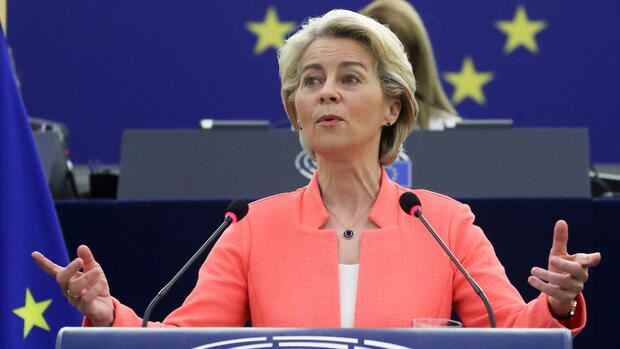Brussels Some things in the European Union seem a bit copied from role models in the USA. The US President regularly gives a “State of the Union” speech. In the EU, the counterpart is called “State of the European Union”, held on Wednesday morning in the Parliament in Strasbourg. The pathos with which EU Commission chief Ursula von der Leyen tries to charge this speech has also been copied.
In terms of content, however, von der Leyen anticipates the USA. It is attacking the Americans because they have not yet presented a plan for how they want to achieve their climate goals. “The previous commitments for 2030 will not limit global warming to 1.5 degrees,” the Commission President accuses countries “from the USA to Japan”.
The announcement to China is even clearer: The goals set by President Xi Jinping are “encouraging”, but China must now show how it wants to achieve them. If China showed how it can do without coal, “the world would be relieved,” says von der Leyen.
The statements show that the EU Commission is aware of how powerless it is against climate change on its own. Massive investments worldwide are needed to stop it. If the oil saved in Europe is burned in other countries, the efforts in this country have not been worthwhile.
Top jobs of the day
Find the best jobs now and
be notified by email.
Without ambitious plans in Europe, however, the likelihood that other nations will set off also decreases. China can at least argue that the prosperity of its citizens is far from being on a European level. And in the USA there is no awareness of the impending climate catastrophe in large parts of the population.
Proposals are likely to be taken apart
This is the strongest argument against European climate policy, and it threatens to become a self-fulfilling prophecy: Many economic politicians, referring to the immobile Chinese, reject all measures that cost the economy or the citizens something.
The members of the European Parliament and, in parallel, the ministers from the member states will dismantle the Commission’s climate protection proposals in the coming months and reassemble them according to their ideas. And not everyone involved wants to take the risk of jeopardizing jobs without making an effective contribution to climate protection.
There is hardly a proposal by the Commission that has not already been met with strong opposition. The companies should no longer receive free CO2 certificates, but they have powerful advocates in parliament. Others fear that the carbon price of gasoline, diesel, heating oil and gas will cause unrest among citizens who will have to pay it.
The CO2 border adjustment, which is supposed to ensure clean imports, could be reduced to an experiment for a few small industries. The plan to make cars climate-neutral is overloaded with ideas to somehow still save the internal combustion engine. Hardly anyone argues openly that they don’t want to go ahead as long as other countries don’t follow suit. But the argument always resonates in the background.
Von der Leyen was concerned about her climate protection package: “I am counting on Parliament and the member states to keep the package and not lose sight of the goals,” she said.
Carefully chosen timing
The commission chose the timing carefully. None of the laws are likely to fail by the end of October. All climate politicians have the date firmly in their sights: the World Climate Conference (COP) begins in Glasgow on October 31.
Six years earlier, the countries of the world had agreed on the two-degree target in Paris. Now they want to be more specific about how it is to be achieved, for example through a global phase-out of coal and internal combustion engines for cars. “The COP in Glasgow will be a moment of truth for the global community,” said von der Leyen.
There is also a lot of money involved. The industrialized countries have promised those countries that cannot invest enough in climate protection on their own to invest 100 billion euros a year by 2025. But so far they are significantly lower. 25 billion dollars a year come from Europe, “but others leave a gaping gap,” said von der Leyen.
She now wants to add another four billion a year until 2027 and thus connects a request to US President Joe Biden: “If the USA and the EU would close the funding gap together, that would be a strong signal,” said von der Leyen.
More: Interview with the EU Climate Commissioner: “We will all have to adapt parts of our lives”
.
